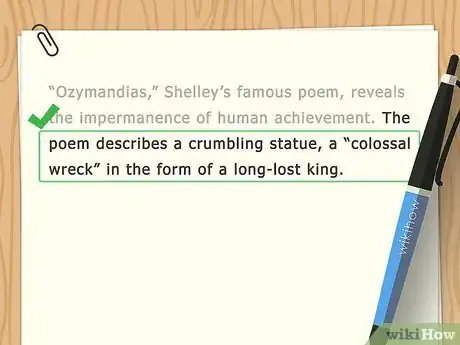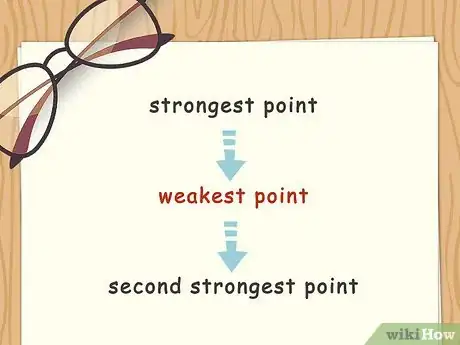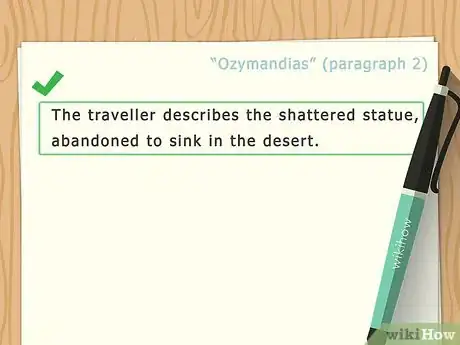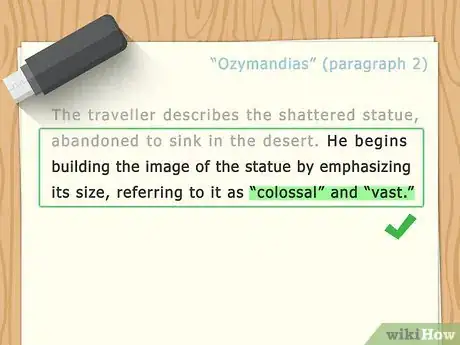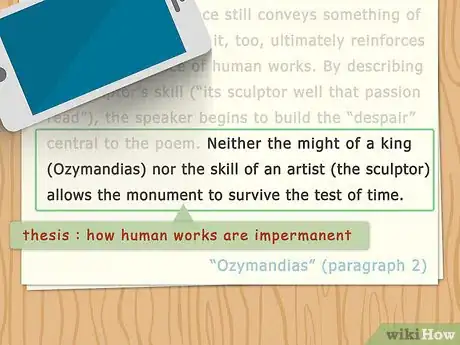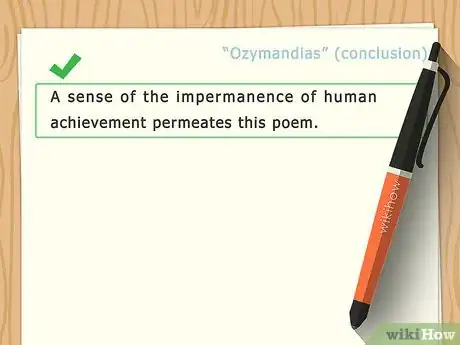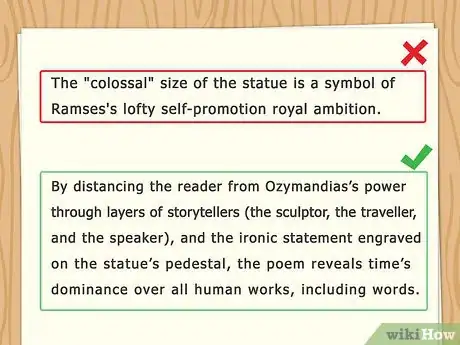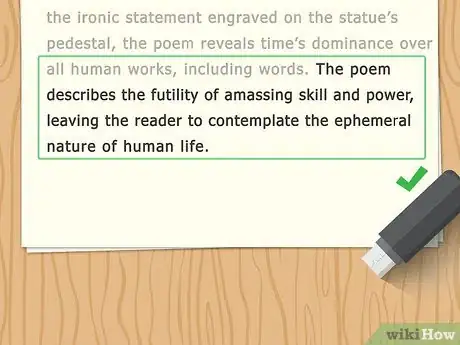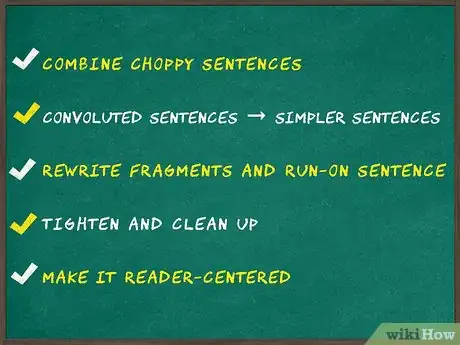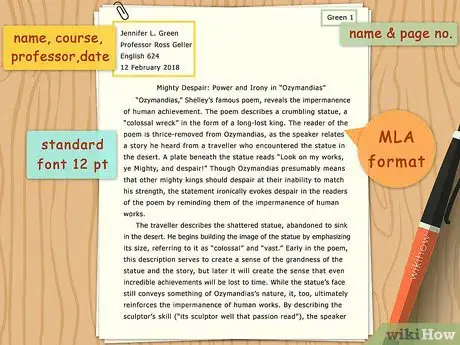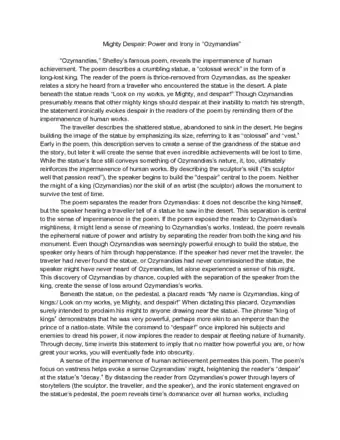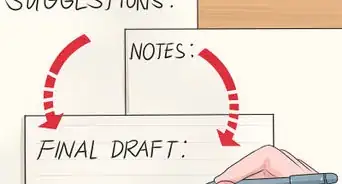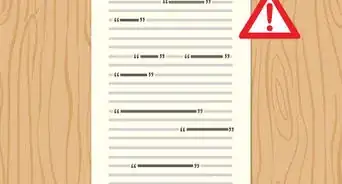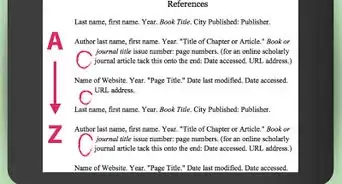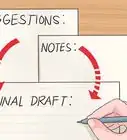This article was co-authored by Jake Adams and by wikiHow staff writer, Danielle Blinka, MA, MPA. Jake Adams is an academic tutor and the owner of Simplifi EDU, a Santa Monica, California based online tutoring business offering learning resources and online tutors for academic subjects K-College, SAT & ACT prep, and college admissions applications. With over 14 years of professional tutoring experience, Jake is dedicated to providing his clients the very best online tutoring experience and access to a network of excellent undergraduate and graduate-level tutors from top colleges all over the nation. Jake holds a BS in International Business and Marketing from Pepperdine University.
There are 9 references cited in this article, which can be found at the bottom of the page.
wikiHow marks an article as reader-approved once it receives enough positive feedback. In this case, several readers have written to tell us that this article was helpful to them, earning it our reader-approved status.
This article has been viewed 509,825 times.
Five paragraph essays are a common assignment throughout your school career, especially in high school and college. Since any subject can include a five paragraph essay, you’ll want to be good at writing them. Luckily, five-paragraph essays are really easy to write if you know the expected format and give yourself the time you need to write it. To write your five paragraph essay, draft your introduction, develop three body paragraphs, write your conclusion, and revise and edit your essay.
Steps
Drafting Your Introduction
-
1Start with a hook.[1] Your hook should capture your audience’s attention, so choose a creative way to introduce your topic. This sentence should be a generalized statement about your topic that gives the reader a basic idea about your paper's topic. Quotes, anecdotes, and quips all make great hooks for an essay.[2]
- For example, you could phrase your hook like this: Nature’s life cycle is often used as a metaphor to convey ideas about the passage of life.
- If you are writing a persuasive essay, don’t include your stance in your hook.
- Don’t say “In this essay” or “I am going to show.” Instead, use the “show, don’t tell” technique using descriptive language.
- It’s often easiest to come up with your hook after you write the rest of your essay. If you’re struggling to come up with one, use a basic placeholder and then create a better hook when you revise your essay.
-
2Include a sentence about your topic that provides more information. Your second sentence should tell the reader more about your topic, while still remaining generalized. Provide necessary background information and define your topic.[3]
- Don’t reveal your main points yet.
- For example, you could say something like this: While spring compares with birth, summer can symbolize maturity, with fall and winter showing a descent toward death.
Advertisement -
3Write another sentence about your topic that leads to your thesis. Continue to provide background information, but start to narrow down toward your thesis. The reader should begin to see the focus of your essay start to take shape.[4]
- This sentence depends on what type of paper you’re writing. If it’s an argumentative paper, introduce both sides of the argument. In an informative paper, mention the central idea and focus.
- As an example, you could narrow your topic like this: Writers often use nature metaphors in their work to show themes about life, such as the blossoming of youth.
-
4Finish the introduction with your thesis.[5] Your thesis should be the last sentence of your introduction, setting up the rest of your essay. Your thesis should contain your stance, your supporting points, or the theme for your points. Each of your paragraphs will connect back to your thesis, so think of it as a road map for your paper.
- For example, your thesis could read like this: In the poem “Raspberries,” the author shows youth through the ripening berries, summer blossoming, and blushing color of the fruit.
- Each of the three examples provided in the thesis will become the topic of a body paragraph. For the example thesis, you would have body paragraphs about ripening berries, summer blossoming, and the blushing color of the fruit.
Developing Three Body Paragraphs
-
1Arrange your points to sandwich your weakest. You should have three points, and you want your reader to view them as being strong. Starting off with your strongest point will show the reader that your stance is right, and ending with your second strongest point will create strong support for your thesis. This means that your weakest point needs to be in the middle.[6]
- You should include three body paragraphs, one for each supporting point.
-
2Begin each body paragraph with a topic sentence. A topic sentence will state your point and connect it back to the thesis. This shows the reader why your point supports the idea(s) you presented in your thesis. The topic sentence will control the rest of your body paragraph, just like your thesis controls your essay.[7]
- Your topic sentence is like a mini-thesis for just that paragraph.
- Use a quote related to your thesis and analyze it in the body paragraph. If you use a topic sentence, put the quote next.
- For example, your topic sentence could look like this: Ripening berries show youth in the poem “Raspberries” by reaching maturity and becoming ready for picking.
-
3Provide your evidence or examples. Depending on the type of essay that you are writing, you may pull evidence from a text or research that you did about your topic. Alternatively, you may use examples to back up your points, especially if you’re writing your essay in class.[8]
- Each paragraph should contain two to three examples or pieces of evidence.
- If you use research, cite your sources in the appropriate format that your instructor specifies.
-
4Add your own commentary. Your commentary is where you show your reader how your evidence or examples support your points and connect back to your topic sentence and thesis. Explain in your own words how your example or evidence proves your ideas, making your stance correct. In your mind, it may seem like you’ve made your point with just your examples. However, commentary is essential to a successful essay.[9]
- Include two to three sentences of commentary for each example or piece of evidence.
- Depending on the type of evidence or examples, it’s often best to alternate your evidence and commentary throughout the paragraph. For example, provide one example, then provide the commentary.
-
5Conclude your paragraph by linking back to your thesis. Summarize the points you’ve made in this paragraph, connecting back to your topic sentence and thesis. Show the reader how the points you expressed in this paragraph provide support.
- For example, you could wrap up your paragraph like this: As the girl plucks the ripe raspberries from the bush and eats them, her actions represent her own youth and readiness to be “plucked” by someone.
Drafting Your Conclusion
-
1Restate your thesis. You should start your conclusion with the ideas you expressed in your thesis. Don’t just copy-and-paste your thesis. Instead, rewrite your thesis with the weight of your argument behind it. Your reader has now read all of your points and evidence, and your thesis should reflect this.[10]
- For example, you could restate your thesis like this: The poem “Raspberries” provides an allegorical representation of youth through a metaphor of ripening berries, summer blossoming, and blushing color of the fruit.
- If you're a beginning writer, it's okay to start your conclusion with "In conclusion." However, if you're an advanced writer, avoid starting your conclusion with statements like “In conclusion,” “To conclude,” or “In the end.”
-
2Summarize how your points supported your thesis. Include a review of how each body paragraph supported your thesis, reminding the reader of your arguments. You should write two to three sentences that briefly explain what you’ve said.[11]
- Use an authoritative tone as you restate your arguments so that your reader walks away knowing that you are correct.
-
3Avoid introducing new information. Providing new information in your thesis can result in lost points on your essay. This will cause your reader to walk away with questions instead of confidence in your ideas. In a conclusion, you should only be restating what you’ve already said.[12]
-
4Tie up your essay with a concluding sentence. Your concluding sentence should leave the reader with a lasting impression of your topic. Use this statement to ensure that your reader keeps thinking about your essay after they have finished reading it. The following are great ideas for writing a good concluding sentence:[13]
- Include a call to action.
- Provide a warning about what could happen if your stance is ignored.
- Create an image in the reader’s mind.
- Include a quote.
- Make a universal statement about life.
Revising and Editing Your Essay
-
1Use spell check. Spell check can easily save you lost points for misspellings. This should be your first step in editing your essay because you can have your word processor do your spell check and then take the provided suggestions.
- Always reread your sentence to make sure that the word processor is suggesting the right word. If you’ve misspelled a word that is similar to another word, then it’s possible that your spell check could suggest the wrong spelling, such as “then” instead of “than.”
-
2Proofread your essay.[14] Take a break from working on your paper. It’s a good idea to give your mind a break, so consider taking a walk, stretching, or taking a bath. Then reread your essay looking for misspelled words, grammar errors, or typos.[15]
- Look for errors that your spell checker missed.
- If you can, ask someone else to proofread your paper. They will usually spot errors that you overlooked.
-
3Revise your essay to improve the flow. As you reread your essay, make sure that your ideas flow well. You may need to add additional commentary or rewrite sentences to make it flow better. You may also decide to add in additional transitions, such as “additionally,” “also,” “at the same time,” or “similarly.” As you revise your essay, double-check that you’ve addressed your thesis throughout.[16]
- Combine choppy sentences.
- Breakup long, convoluted sentences into shorter sentences.
- Rewrite fragments and run-on sentences.
-
4Fix your formatting. Consult your assignment sheet or syllabus to see what formatting conventions your instructor prefers. Adjust your margins, font size, and spacing accordingly. Add your heading and page numbers.
- If you have cited sources, make sure that you include a reference page in the style chosen by your instructor.
Essay Help
Expert Q&A
Did you know you can get expert answers for this article?
Unlock expert answers by supporting wikiHow
-
QuestionHow long should it take to write a 5 paragraph essay?
 Jake AdamsJake Adams is an academic tutor and the owner of Simplifi EDU, a Santa Monica, California based online tutoring business offering learning resources and online tutors for academic subjects K-College, SAT & ACT prep, and college admissions applications. With over 14 years of professional tutoring experience, Jake is dedicated to providing his clients the very best online tutoring experience and access to a network of excellent undergraduate and graduate-level tutors from top colleges all over the nation. Jake holds a BS in International Business and Marketing from Pepperdine University.
Jake AdamsJake Adams is an academic tutor and the owner of Simplifi EDU, a Santa Monica, California based online tutoring business offering learning resources and online tutors for academic subjects K-College, SAT & ACT prep, and college admissions applications. With over 14 years of professional tutoring experience, Jake is dedicated to providing his clients the very best online tutoring experience and access to a network of excellent undergraduate and graduate-level tutors from top colleges all over the nation. Jake holds a BS in International Business and Marketing from Pepperdine University.
Academic Tutor & Test Prep Specialist
-
QuestionHow do I write an essay about myself and where I will be in 10 years?
 Community AnswerThink about your goals and how you will reach them in the next ten years. Imagine how your life will change in terms of friends, family and hobbies, then write about that!
Community AnswerThink about your goals and how you will reach them in the next ten years. Imagine how your life will change in terms of friends, family and hobbies, then write about that!
References
- ↑ Jake Adams. Academic Tutor & Test Prep Specialist. Expert Interview. 20 May 2020.
- ↑ https://www.grammarly.com/blog/five-paragraph-essay/
- ↑ https://www.jscc.edu/academics/programs/writing-center/writing-resources/five-paragraph-essay.html
- ↑ https://www.jscc.edu/academics/programs/writing-center/writing-resources/five-paragraph-essay.html
- ↑ Jake Adams. Academic Tutor & Test Prep Specialist. Expert Interview. 20 May 2020.
- ↑ https://writingcenter.unc.edu/tips-and-tools/college-writing/
- ↑ https://writingcenter.unc.edu/tips-and-tools/college-writing/
- ↑ https://www.bucks.edu/media/bcccmedialibrary/pdf/FiveParagraphEssayOutlineJuly08_000.pdf
- ↑ https://www.ncbi.nlm.nih.gov/pmc/articles/PMC4789530/
- ↑ https://www.grammarly.com/blog/five-paragraph-essay/
- ↑ https://www.grammarly.com/blog/five-paragraph-essay/
- ↑ https://www.bucks.edu/media/bcccmedialibrary/pdf/FiveParagraphEssayOutlineJuly08_000.pdf
- ↑ https://writingcenter.fas.harvard.edu/pages/ending-essay-conclusions
- ↑ Jake Adams. Academic Tutor & Test Prep Specialist. Expert Interview. 20 May 2020.
- ↑ https://owl.purdue.edu/owl/general_writing/the_writing_process/proofreading/proofreading_suggestions.html
- ↑ https://owl.purdue.edu/owl/general_writing/the_writing_process/proofreading/steps_for_revising.html
- ↑ Jake Adams. Academic Tutor & Test Prep Specialist. Expert Interview. 20 May 2020.
About This Article
To write a five paragraph essay, start with an introductory paragraph that includes a hook to capture your audience’s attention, and a thesis that explains the main point you’re trying to make. Then, use the next 3 paragraphs to explain 3 separate points that support your thesis. As you explain each point, use evidence from your research or examples in the text you’re discussing. Finally, conclude your essay with a paragraph summing up the points you’ve made and telling the reader how those points support your thesis. For tips on how to revise your essay to improve the flow and formatting, read on!


